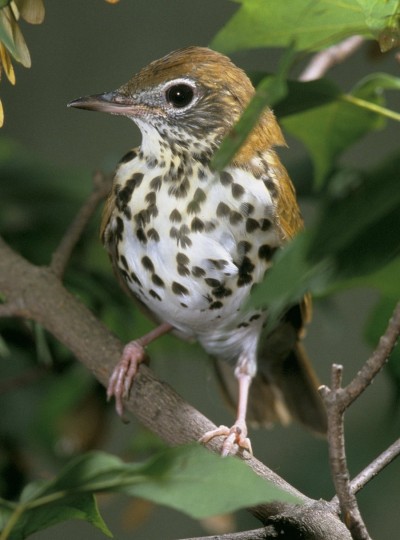
Wood thrush. Image by US Fish and Wildlife Service.
Spring signals the return of backyard birds, but it can also be rough for them.
“Spring is a deadly time for birds for three big reasons,” said American Bird Conservancy (ABC) president Dr. George Fenwick in a release. “Scientists estimate that 300 million to one billion birds die each year from collisions with buildings, many during arduous migrations in unfamiliar environments. Up to 50 million die from encounters with communication towers and up to six million may die each day from attacks by cats left outdoors. These deaths occur year-round, but many occur during spring and fall migration.”
He said some studies suggest that perhaps as many as half of all migrating birds do not make it back home, succumbing to various threats on either end of the journey.
A federal government study reported that about 20 percent of the US population—47 million people—participates in bird watching.
About 40 percent of birders (18 million people) actually travel to see birds and spend about $41 billion annually in pursuit of their pastime.
“Protecting and helping birds is not only the right thing to do,” said Fenwick. “It is also good for the economy and the future of our environment. Birds are invaluable as controllers of insect pests, as pollinators of crops, and as dispersers of native plant seeds. They also generate tremendous economic revenues through the pastimes of bird feeding and bird watching.”
The ABC has a list of ways to help birds in spring:
- Keep cats inside. This is best for your cat as well as for the birds, as indoor cats live an average of three to seven times longer than their outdoor counterparts. Cats are responsible for an estimated 2.4 billion bird deaths each year. In the spring, young birds or nestlings often end up on the ground, attracting the fatal attention of a nearby cat.
- Prevent birds from hitting your windows. As many as one billion birds die each year after colliding with glass in buildings. You can reduce this problem at your home by applying a variety of window treatments, like bird tape.
- Eliminate pesticides from your yard. Even those pesticides that are not directly toxic to birds can pollute waterways and reduce insects that birds rely on for food. For rodent control, seal cracks, remove food sources, and use snap and electric traps rather than rodenticides, which can poison raptors such as hawks and owls as well as young children. Be sure not to garden with neonicotinoid-coated seeds, or neonics, which are lethal to songbirds as well as to bees and other invertebrates.
- Buy organic food. Going organic helps to reduce pesticide use on farms and increases the market for produce grown without the use of pesticides, which can be toxic to birds and other animals, and will help to reduce the use of these hazardous chemicals in the United States and overseas.
- Create backyard habitat using native plants. When you garden with plants that evolved in your local habitat, you supply native insects and their larvae with food, which in turn are an irreplaceable food source provided by birds to their nestlings. Create a diverse landscape by planting native grasses, flowers, and shrubs that attract birds.
- Reduce your carbon footprint. While all forms of energy use impact birds, small individual actions an add up and make a difference. Use a hand-pushed or electric lawnmower, carpool, and use low-energy bulbs and Energy Star appliances. Less energy used means less habitat destroyed for energy production.
- Donate old bird-watching equipment. Binoculars will be appreciated by local bird watching groups—they can get them to schools or biologists in other countries who may not have the resources they need. More people studying birds means more voices for bird conservation.
- Keep bird feeders and bird baths clean. If you feed the birds, make sure you aren’t accidentally allowing the spread of disease. Disinfect feeders and bird baths, and change water regularly or use a drip system to prevent mosquitoes from breeding.
 Your Privacy Choices
Your Privacy Choices
 The
The